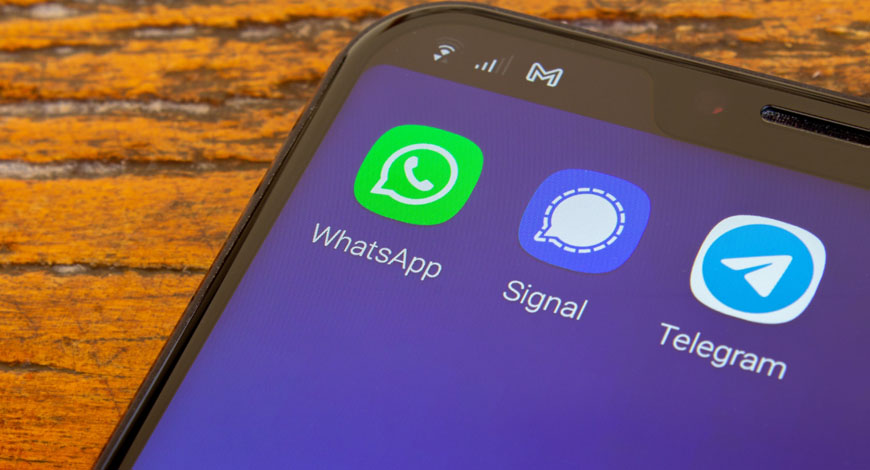CSPs
Should TRAI start regulating OTTs such as WhatsApp, Telegram and Signal?

Almost three years after it first recommended against creating a specific regulatory framework for over-the-top (OTT) communication services like WhatsApp, Zoom, and Google Meet, the Telecom Regulatory Authority of India (TRAI) is revisiting its stance and starting consultations on how these services can be regulated.
In a consultation paper released Friday (June 7), the TRAI has asked stakeholders to send suggestions about regulating services and whether a selective banning of OTT services can be done as opposed to shutting down the entire Internet. Regulating such services has been a long standing demand of telecom operators, who have for years, been advocating for ‘same service same rules’.
The development signals the intersectionality in regulations around Internet services, with multiple government agencies claiming a stake in the sector. The draft telecom Bill released by the Department of Telecommunication (DoT) last year had also recommended bringing OTT services under its ambit by creating a licensing regime for them. The IT Ministry is already the nodal ministry for regulating such services.
Is this a U-turn by TRAI?
In September 2020, TRAI recommended against regulatory intervention for OTT platforms, saying that it should be left to market forces. However, it also said that the sector should be monitored and intervention should be done at an “appropriate time”.
In 2022, the DoT wrote back to the authority, requesting it to reconsider its recommendations and also suggest a suitable regulatory mechanism for “selective banning of OTT services”.
Why a regulation for OTT communication services?
The TRAI has essentially argued that while telecom operators and OTT platforms such as WhatsApp offer similar services, they are not bound by the same requirements – as a result, there is a need for regulatory parity.
It said that telecom operators need a service licence for offering voice and SMS services, and on the other hand “OTT communication service providers offer voice call, and messaging and video call services similar to the services provided by TSPs, without any such licence”.
Telecom service providers in India are regulated by several laws, including the Indian Telegraph Act, 1885, the Wireless Telegraphy Act, 1933 and the Telecom Regulatory Authority of India Act, 1997, and have to adhere to requirements such as lawful interception. Such requirements, TRAI said, are not applicable to OTT services currently.
It added that OTT services do not financially contribute towards increasing telecom services penetration in the country, unlike the operators who have to pay towards the Universal Service Obligation Fund (USOF).
Why is TRAI exploring the selective banning of OTT apps?
TRAI said that the shutdown of telecommunications or the Internet can have “significant ramifications for a country’s economy”. “It also disrupts critical services such as education and healthcare. Consequently, such a shutdown affects the life and livelihood of the citizens of the country,” the regulator said.
This has been cited as a reason to explore selectively banning OTT apps, as opposed to the whole Internet, a recommendation that was first made by the Parliamentary Standing Committee on IT.
“…websites that use dynamic IP addresses and are hosted on cloud servers can pose a challenge to conventional methods of blocking,” TRAI said. “Advanced techniques can be employed to identify and block access to such websites.”
“Further, there may be scenarios where the targeted websites use Hypertext Transfer Protocol Secure (https) protocol. HTTPS protocol provides encryption and security for websites, making it difficult for service providers to block content on these sites. However, there are still ways to block or filter content at a network level, such as using a firewall or content filtering software,” it added.
What is the key fight between telcos and OTT apps?
Apart from a different regulatory regime, there are other financial considerations for the tussle between telcos and Internet applications. Key among them is the avenue of revenues that has shifted from voice and SMS to data.
TRAI said that the contribution of data usage in the revenue from mobile subscribers has grown more than ten times from 8.10% in the quarter ending (QE) June 2013 to 85.1% in the QE December 2022.
From the year 2014 to 2022, the volume of monthly wireless data usage in India grew by about 156 times from 92.4 million GB (December 2014) to 14.4 trillion GB (December 2022), TRAI said.
In the same period, the average revenue from data usage per wireless subscriber per month in the country increased by about 5.6 times from Rs. 22.19 (for GSM service in the quarter ending December 2014) to Rs. 125.05 (quarter ending December 2022).
What did the draft telecom Bill prescribe for OTT services?
One of the key changes is the inclusion of new-age over-the-top communication services like WhatsApp, Signal and Telegram in the definition of telecommunication services.
As per the draft law, providers of telecommunication services will be covered under the licensing regime, and will be subjected to similar rules as other telecom operators. This issue has been under contention for several years now with telecom service providers seeking a level-playing field with OTT apps over communication services such as voice calls, messages, etc. where operators had to incur high costs of licences and spectrum, while OTT players rode on their infrastructure to offer free services. Moneycontrol















You must be logged in to post a comment Login